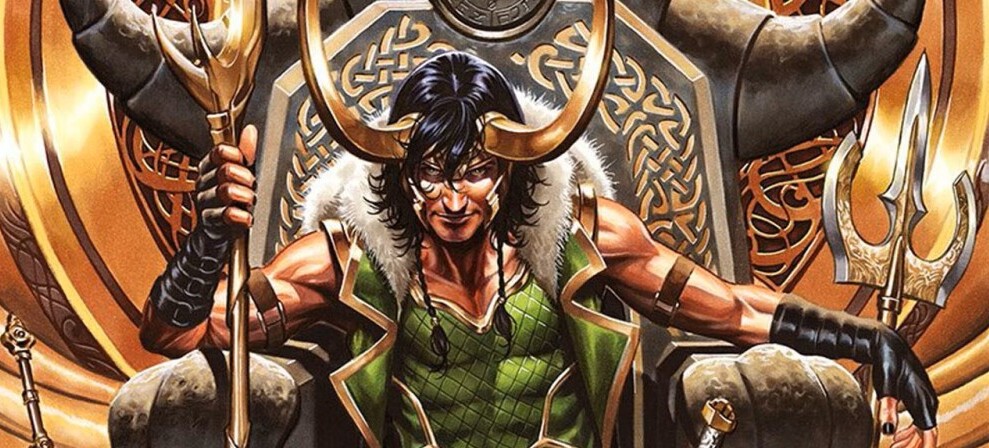
Introduction: A Deeper Dive into Loki’s Many Faces
Loki, the trickster god of Norse mythology, has fascinated people for centuries with his cunning and unpredictable nature. His influence spans from ancient myths to modern pop culture, especially through the Marvel Universe.
After my last post, The Evolution of Loki: From Villain to Anti-Hero, I received an enthusiastic response from my oldest granddaughter. She was especially excited because Loki is her favorite Marvel character, mainly thanks to Tom Hiddleston’s charismatic portrayal in the MCU. Her excitement got me thinking: why not dig deeper into one of the most defining events associated with Loki? Thus, I decided to explore Loki’s role in Ragnarok—a cataclysmic event that differs in fascinating ways across Norse mythology, Marvel Comics, and the Marvel Cinematic Universe (MCU). Let’s journey through these different renditions and see how the trickster god’s involvement shapes this epic tale.
What Is Ragnarok?
Before diving into Loki’s role, it’s important to understand what Ragnarok actually is. The term “Ragnarok” has different meanings depending on the source, but at its core, it represents a profound end—an apocalypse followed by a new beginning.
Ragnarok in Norse Mythology
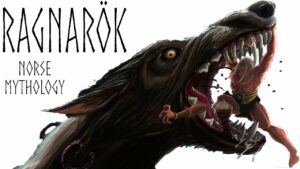
In Norse mythology, Ragnarok is the prophesied end of the world—a series of catastrophic events leading to the destruction of gods, giants, and the cosmos. The term “Ragnarok” can be translated to mean “fate of the gods” or “twilight of the gods,” reflecting both the death of key deities and the end of the known universe (Simek, 2007, Dictionary of Northern Mythology).
This post contains affiliate links. If you make a purchase through these links, I may earn a commission at no extra cost to you.
This event is depicted not just as an apocalypse but also as a cycle of death and rebirth, where the world is destroyed only to be created anew. The primary sources for the myth are The Poetic Edda (Larrington, 1996, Oxford University Press) and The Prose Edda (Sturluson, 1987, University of Texas Press). These texts describe the foretold battles, betrayals, and cosmic destruction, ultimately leading to the world’s renewal.
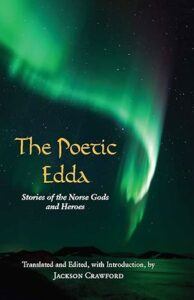 In The Poetic Edda, a collection of Old Norse poems, the seeress’s prophecy in the “Völuspá” recounts the events of Ragnarok, from the great winter (Fimbulwinter) to the final battle and rebirth (Larrington, 1996).
In The Poetic Edda, a collection of Old Norse poems, the seeress’s prophecy in the “Völuspá” recounts the events of Ragnarok, from the great winter (Fimbulwinter) to the final battle and rebirth (Larrington, 1996).- The Prose Edda, written by Snorri Sturluson, offers a prose interpretation of these myths, elaborating on the roles of the gods, giants, and other beings during Ragnarok, including the death of Odin, Thor, and other significant figures (Sturluson, 1987).
Various key events define Ragnarok. The death of Baldur, orchestrated by Loki, is one of the first significant triggers. Following this, there is a harsh winter known as Fimbulwinter, lasting three years without summer. Then, Loki and his offspring—Fenrir the wolf and Jormungandr the Midgard Serpent—break free from their constraints, joining the forces that rise against the gods at the great battle on the plains of Vigrid. The world is engulfed in flames and ultimately submerged in water, leading to a period of darkness and destruction before the dawn of a new era.
Ragnarok in Marvel Comics
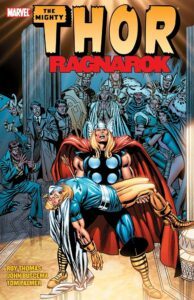 Marvel Comics, on the other hand, offers a different spin on Ragnarok. Adapting the myth to fit its superhero universe, Ragnarok has been depicted in various storylines with different interpretations. While the essence of chaos and rebirth remains, the narratives often weave complex relationships and modern themes into the ancient framework. For instance, the Thor comic series presents multiple versions of Ragnarok, each tailored to fit the evolving Marvel Universe. Loki’s role often shifts, ranging from a villainous instigator to a complex anti-hero with redemptive arcs. Key storylines like Thor: Disassembled (2004-2005, Michael Avon Oeming, Andrea Di Vito) show Ragnarok as a recurring cycle of death and rebirth, often used to reset the narrative and add new layers to the characters. The concept, while retaining its core elements of destruction and renewal, becomes a rich canvas for exploring themes like destiny, sacrifice, and transformation.
Marvel Comics, on the other hand, offers a different spin on Ragnarok. Adapting the myth to fit its superhero universe, Ragnarok has been depicted in various storylines with different interpretations. While the essence of chaos and rebirth remains, the narratives often weave complex relationships and modern themes into the ancient framework. For instance, the Thor comic series presents multiple versions of Ragnarok, each tailored to fit the evolving Marvel Universe. Loki’s role often shifts, ranging from a villainous instigator to a complex anti-hero with redemptive arcs. Key storylines like Thor: Disassembled (2004-2005, Michael Avon Oeming, Andrea Di Vito) show Ragnarok as a recurring cycle of death and rebirth, often used to reset the narrative and add new layers to the characters. The concept, while retaining its core elements of destruction and renewal, becomes a rich canvas for exploring themes like destiny, sacrifice, and transformation.
Ragnarok in the MCU
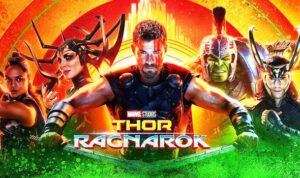
In the MCU, “Thor: Ragnarok” (2017) directed by Taika Waititi, reimagines the myth with a blend of action, humor, and drama, setting itself apart from both the ancient tales and the comics. Here, Ragnarok is not just the end but also a catalyst for Thor’s growth and the liberation of Asgard’s people. Loki’s role transitions from a mischievous antagonist to a reluctant ally, highlighting his complicated relationship with Thor and his inner conflict between self-interest and the greater good.
These varied portrayals of Ragnarok, whether in myth, comics, or film, offer a nuanced look at themes of destruction and renewal. While Norse mythology presents it as an inevitable end followed by rebirth, Marvel’s interpretations serve more as tools for character development and narrative expansion. Understanding these differences helps in appreciating the multifaceted dimensions of Loki’s character and his ever-evolving story.
Now that we’ve set the stage, let’s look at Loki’s role in each rendition of Ragnarok, starting with the original myths.
Loki’s Role in Ragnarok in Norse Mythology
Loki as the Catalyst of Chaos
In Norse mythology, Loki is far from a mere mischievous trickster; he is a pivotal figure whose actions set Ragnarok in motion. Loki is the father of many of the monstrous beings who play critical roles in the event, such as the giant wolf Fenrir and the Midgard Serpent Jörmungandr. His deceit and betrayals, especially his involvement in the death of Balder, the most beloved of the gods, are crucial triggers for Ragnarok.
Events Leading Up to Ragnarok
- The Death of Balder: The death of Balder is often considered the first sign of Ragnarok. Balder, a god of light and purity, is killed by his blind brother Hodr, who is tricked by Loki into throwing a mistletoe dart—Balder’s only weakness. Loki’s malice in orchestrating Balder’s death brings immense grief to the gods and leads to Loki’s eventual punishment.
 Loki’s Imprisonment: For his crimes, Loki is bound by the gods in a cave, where a venomous snake drips poison onto his face. His wife, Sigyn, stays by his side, catching the venom in a bowl, but whenever she leaves to empty it, the poison falls on Loki, causing him great pain. His writhing and screaming are said to cause earthquakes in Midgard (the human world).
Loki’s Imprisonment: For his crimes, Loki is bound by the gods in a cave, where a venomous snake drips poison onto his face. His wife, Sigyn, stays by his side, catching the venom in a bowl, but whenever she leaves to empty it, the poison falls on Loki, causing him great pain. His writhing and screaming are said to cause earthquakes in Midgard (the human world).- Escape and Final Battle: As Ragnarok approaches, Loki escapes his bonds and joins forces with the giants and other enemies of the gods. He sails a ship made from the fingernails of the dead, leading an army of chaos against Asgard.
Loki’s Fate
During the final battle, Loki fights against the gods on the side of the giants. He meets his end in a duel with Heimdall, the guardian of the Bifrost. The two slay each other, marking the end of Loki’s involvement in the mythic apocalypse. His death symbolizes both the culmination of his trickery and the inevitability of fate in Norse mythology.
Post-Ragnarok, the world renews itself. Despite his destructive role, Loki’s actions usher in a new era. The surviving gods and humans rebuild the world, cleansed and fertile once again. Loki’s mythological tale demonstrates the thin line between chaos and creation, emphasizing that destruction can sometimes pave the way for renewal.
Understanding Loki’s traditional role in Norse mythology gives us a foundational perspective to compare his character development across different mediums. His journey from a cunning trickster to a pivotal figure in the apocalypse highlights the enduring power and complexity of these ancient stories.
As an Amazon Associate, I earn from qualifying purchases.
Loki’s Role in Ragnarok in Marvel Comics
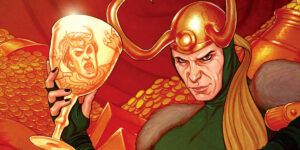
Marvel Comics has adapted and reimagined Ragnarok multiple times, with Loki often playing a key role in these stories. Here are some of the most notable versions:
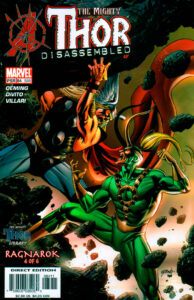 Thor: Disassembled (Thor Vol. 2, #80-85, Michael Avon Oeming, Daniel Berman, Andrea Di Vito, Dec 2004 – Feb 2005) In this storyline, Loki actively triggers Ragnarok by creating new weapons for the enemies of Asgard and manipulating the forces of chaos to bring about its destruction. Loki’s motivations are driven by his desire for revenge and a deep-seated hatred of the gods, particularly his adoptive brother Thor. By the end of the series, Loki has succeeded in bringing about the end of Asgard, though he too perishes in the ensuing battle.
Thor: Disassembled (Thor Vol. 2, #80-85, Michael Avon Oeming, Daniel Berman, Andrea Di Vito, Dec 2004 – Feb 2005) In this storyline, Loki actively triggers Ragnarok by creating new weapons for the enemies of Asgard and manipulating the forces of chaos to bring about its destruction. Loki’s motivations are driven by his desire for revenge and a deep-seated hatred of the gods, particularly his adoptive brother Thor. By the end of the series, Loki has succeeded in bringing about the end of Asgard, though he too perishes in the ensuing battle.- Thor: God of Thunder (Thor: God of Thunder #1-25, Jason Aaron, Esad Ribic, Nov 2012 – Sept 2014) In this modern epic, Loki’s involvement in Ragnarok is more indirect. This series focuses on Thor’s battle against Gorr the God Butcher, but it also sets the stage for the idea that Ragnarok is not just a singular event but a cycle of death and rebirth. Loki is portrayed as a trickster who continues to defy expectations and play both sides, but his actions contribute to the inevitability of Ragnarök’s occurrence.
- Siege (Siege #1-4, Brian Michael Bendis, Olivier Coipel, Jan – April 2010) In “Siege,” Loki initially aids Norman Osborn in his assault on Asgard, manipulating events to his advantage. However, as the storyline progresses, Loki has a change of heart and decides to help the Asgardians defend their home. He sacrifices himself to save Asgard, marking a rare moment of redemption for the trickster god. His death, however, does not prevent the partial destruction of Asgard.
- Loki: Agent of Asgard (Loki: Agent of Asgard #1-17, Al Ewing, Lee Garbett, Feb 2014 – Sept 2015) In “Loki: Agent of Asgard,” Loki tries to break free from his destiny as the God of Lies. This series portrays him as a complex anti-hero, seeking redemption and a way to change his fate. The story explores themes of identity, destiny, and the possibility of change, with Loki attempting to prevent a new Ragnarok while facing his darker self, known as “Old Loki.”
Purchase from Amazon!
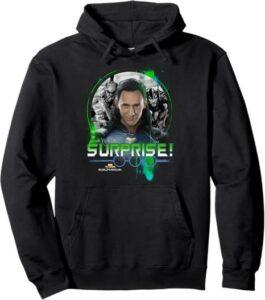
Marvel Comics employs Ragnarok as a recurring theme, using it to reset narratives and explore new dimensions of its characters. Loki’s roles across these storylines demonstrate his adaptability and the depth of his character. Each rendition offers a fresh perspective, whether he is a deceptive trickster, an anti-hero seeking redemption, or a key player in cosmic conflicts. Understanding these variations helps appreciate the intricate layers of Loki’s character and his enduring appeal in the Marvel Universe.
Loki’s Role in Ragnarok in the MCU
Thor: Ragnarok (2017): A Trickster Turned Reluctant Hero
The Marvel Cinematic Universe (MCU) propels Loki into mainstream consciousness, blending the charm of Tom Hiddleston’s portrayal with rich storytelling. The MCU’s take on Ragnarok, particularly in Thor: Ragnarok (2017), directed by Taika Waititi, offers a unique perspective distinct from both Norse mythology and Marvel Comics.
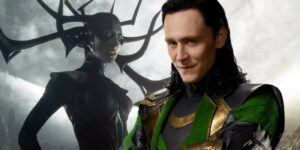
The MCU takes a different approach to Ragnarok, blending humor, action, and drama. In “Thor: Ragnarok,” Loki’s role is multifaceted and evolves throughout the film.
- Ruler of Asgard: At the beginning, Loki is ruling Asgard disguised as Odin, living in luxury while neglecting his responsibilities. His deception is eventually uncovered by Thor, who forces him to help find their true father, Odin.
- Catalyst for Hela’s Release: Loki’s actions inadvertently lead to the release of Hela, the Goddess of Death, who is far more powerful than either Thor or Loki. His initial attempts to survive by manipulating situations to his advantage lead to Hela’s emergence, which brings about the imminent destruction of Asgard.
- Escape to Sakaar and Redemption: Loki finds himself on Sakaar, where he initially aligns himself with the Grandmaster, seeking comfort and power. However, he eventually joins forces with Thor to escape Sakaar and return to Asgard. His actions on Sakaar reflect his complex nature, balancing self-preservation with a reluctant sense of duty to his people.
- Resurrecting Surtur: In the final battle, Loki plays a crucial role in resurrecting Surtur, the fire demon whose destiny is to destroy Asgard. By triggering Surtur’s return, Loki ensures the prophecy of Ragnarok is fulfilled, allowing Hela to be defeated, but also resulting in the destruction of Asgard.
Unlike the mythological narrative where Loki directly triggers Ragnarok, the MCU portrays him in a more ambiguous role. His release of Hela inadvertently initiates the apocalyptic events. This shift from a deliberate instigator to an accidental catalyst adds depth to Loki’s character, portraying him more as a flawed figure than a purely malevolent force.
Purchase from Amazon!
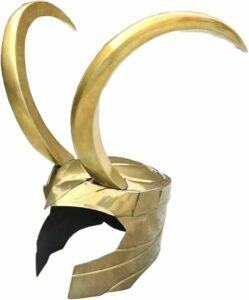
Loki’s relationship with Thor significantly evolves in the MCU. Despite their tumultuous past, they align against Hela, showcasing a reluctant but profound camaraderie. This dynamic adds an emotional layer to Loki’s character, highlighting themes of family, loyalty, and redemption. Their alliance against a common enemy underscores the complexity of Loki’s motivations and his struggle between self-interest and a larger cause.
The movie’s use of humor and levity, balancing the intense narrative. Loki’s mischievous nature
shines through in his interactions with other characters, blending wit with vulnerability. This multifaceted portrayal breaks away from the binary good-vs-evil trope, painting Loki in shades of grey.
As Ragnarok concludes, Loki’s decision to save the Asgardians by facilitating their escape marks a significant character development. This act, driven by a mix of self-preservation and genuine concern, signifies a shift in Loki’s priorities. It sets the stage for his further evolution in subsequent MCU films, where he continues to grapple with his identity and choices.
In summary, the MCU’s portrayal of Loki during Ragnarok offers a layered, evolving character
arc. By blending action, humor, and emotional depth, Loki transitions from a trickster to a reluctant hero, making him one of the most compelling characters in the Marvel Cinematic Universe.
Themes of Change, Redemption, and Identity
Loki’s role in Thor: Ragnarok embodies themes of change, redemption, and self-discovery. While he remains a trickster at heart, his willingness to side with Thor and ultimately contribute to the salvation of Asgard’s people shows a side of him that is capable of growth and heroism. His final act, though self-serving in some ways, also demonstrates his acceptance of the larger forces at play and his ability to make difficult decisions for the greater good, even if it means losing everything he once sought to control.
Comparing the Themes Across Mythology, Marvel Comics, and the MCU
- Mythology: Fate and Inevitable Doom – In Norse mythology, Loki’s role in Ragnarok is inextricably tied to fate and destiny. The myths emphasize the inevitability of the gods’ downfall and Loki’s part in precipitating it. His actions, whether out of malice or rebellion, are ultimately tools of fate, serving to fulfill the prophecy of Ragnarok. Loki’s character is one of chaos and complexity, embodying both the necessary evil and the tragic inevitability that drives the world’s destruction and rebirth. His fate is sealed, and his death marks the end of an era and the start of something new.
- Marvel Comics: Cycles of Destruction and Rebirth – In Marvel Comics, Ragnarok is not a single, conclusive event but a recurring cycle that the gods and Asgardians are condemned to relive. This portrayal introduces a more existential perspective, where Loki’s actions—though similar in ambition and betrayal—take on new meaning. The cycle suggests that even gods are not beyond the grip of destiny and that their actions, while free, are part of an ever-repeating loop. Loki is both a catalyst and a victim, navigating between his desire for chaos and his struggle against the confines of his predestined role. The comics present him in various shades—from villain to anti-hero to reluctant ally—mirroring the cyclical nature of Ragnarok itself.
- MCU: Redemption, Change, and Growth – The MCU’s take on Loki’s role in Ragnarok departs significantly from both myth and comics by focusing on character development, personal growth, and redemption. Loki is portrayed as a conflicted character torn between his trickster nature and his emerging conscience. The themes of change and renewal are not just cosmic in scale but are deeply personal, reflecting Loki’s internal struggle with his identity. His willingness to help Thor, albeit reluctantly, and his pivotal role in bringing about Ragnarok to defeat a greater evil (Hela) marks a transformative arc, positioning him as more of a redeemed anti-hero than the bringer of doom.
Conclusion: Loki’s Multifaceted Role Across Different Universes
Loki’s role in Ragnarok is as varied and complex as the character himself. In Norse mythology, he is both a necessary evil and an agent of fate, driving the apocalypse that leads to a new beginning. In Marvel Comics, he is a multifaceted figure who instigates chaos and destruction but also reflects deeper existential themes of fate, choice, and cyclicality. Finally, in the MCU, Loki becomes a more humanized character, capable of growth and redemption, whose involvement in Ragnarok is less about cosmic fate and more about personal change and the struggle for identity.
For fun, watch this comical clip from Thor: Ragnarok, showing an example of Loki’s mischief.
Each rendition adds layers to Loki’s character, allowing us to see the many sides of the trickster god—villain, anti-hero, catalyst, and even reluctant savior. Through these differing portrayals, we see that Loki’s essence, much like Ragnarok itself, is about transformation and the eternal dance between destruction and renewal.
Understanding these differing themes enriches our appreciation of Loki’s character. He is a testament to storytelling’s power, illustrating how ancient myths can evolve and remain relevant in modern narratives. Loki’s enduring appeal lies in his complexity, making him a captivating figure across ages and mediums.
So, which version of Loki do you find most compelling? Does the idea of fate or choice resonate more with you? Share your thoughts, favorite Loki moments, or how you think his story should evolve in future Marvel adaptations. And, as always, feel free to share this post on your favorite social media platform!
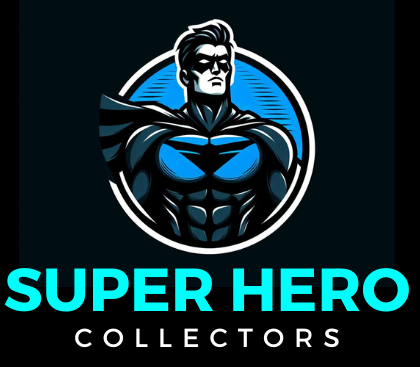
I really enjoyed your article and the way you explored Loki’s multifaceted nature across different mediums. It’s fascinating how Loki’s role evolves from Norse mythology to Marvel Comics and then into the Marvel Cinematic Universe (MCU). Your personal touch, mentioning your granddaughter’s enthusiasm, added warmth and relatability to the piece.
I particularly appreciated how you set the stage for discussing Loki’s role in Ragnarok by highlighting his transition from a villain to an anti-hero. It would be interesting to delve even deeper into how different portrayals—mythological vs. modern—affect our perception of Loki as a character. For instance, the Norse myths often depict him as a complex figure with both malevolent and helpful qualities, while the MCU presents him with more redeemable traits over time. How do these portrayals reflect societal values or changes in storytelling over the centuries?
Overall, a fantastic introduction that promises an engaging exploration of Loki’s many faces. I’m looking forward to reading more about his involvement in Ragnarok across these different versions!
Thank you so much, Isaac! I’m delighted to hear that you enjoyed the article and found the exploration of Loki’s multifaceted nature intriguing. Including my granddaughter’s enthusiasm for Loki was a personal touch that I hoped would resonate with readers, so I’m glad it added warmth and relatability to the piece!
You raise a fascinating point about how different portrayals of Loki—mythological versus modern—affect our perception of him. In Norse mythology, Loki is often portrayed as a complex and contradictory figure. He’s neither wholly good nor evil, embodying both trickster elements and a cunning nature that sometimes benefits the gods, like when he helps them retrieve their stolen treasures. But his role as a catalyst for chaos is undeniable—his actions ultimately lead to Ragnarok, the end of the world. This dual nature reflects a pre-modern worldview that recognized life’s unpredictable and often contradictory nature, where figures like Loki could be agents of both creation and destruction, a necessary balance in a world governed by fate and the whims of gods.
In contrast, modern portrayals, like those in Marvel Comics and the MCU, tend to focus on more redeemable qualities in Loki over time. For example, Marvel’s Loki begins as a clear antagonist, but as the comics and films progress, we see him evolve into a more nuanced character, straddling the line between villain and anti-hero. The MCU in particular has expanded on this, showing Loki’s vulnerability, his strained relationship with his family, and his capacity for growth and change. This shift from a purely chaotic trickster to a character with more depth and moral ambiguity reflects a modern storytelling trend that seeks to humanize traditionally villainous characters, allowing for complexity and even redemption.
These changes can be seen as reflecting contemporary values. Today’s audiences often crave stories that break away from black-and-white morality, embracing characters who exist in shades of grey. This mirrors a broader cultural trend where we are more likely to empathize with flawed individuals, seeing them not just as antagonists, but as products of their experiences and choices. Loki’s portrayal in the MCU, especially his evolution from a vengeful brother in “Thor” to a tragic anti-hero in “Loki,” speaks to our current fascination with character development and redemption arcs.
Additionally, the contrast between mythological and modern Lokis could also highlight shifts in how societies perceive chaos and order. In ancient times, Loki’s role in bringing about Ragnarok might have reflected a world view where chaos was a necessary precursor to renewal—an acceptance that even destruction had its place in the cosmic cycle. In modern portrayals, however, chaos is often reinterpreted through a more personal lens. Loki’s internal conflicts, his need for acceptance, and his attempts at redemption show a shift towards a more individualized understanding of chaos, one that can be resolved through personal growth and choice rather than just fate.
I think exploring these themes further could lead to a rich discussion on how our cultural narratives shape and reshape figures like Loki over time. Thank you for such a thought-provoking comment and for inspiring me to think deeper about these connections! I’m excited to dive further into Loki’s role in Ragnarok across different versions, and I hope you’ll enjoy the journey along with me.
Warm regards,
Scott
Fascinating exploration of Loki’s role in Ragnarok across Norse mythology, Marvel Comics, and the MCU! I’m intrigued by the differences in his portrayal and the implications for the story.
To further the discussion:
1. How do you think Loki’s character evolution from villain to anti-hero in the MCU influences his role in Ragnarok, compared to his depiction in Norse mythology?
2. What significance does Loki’s relationship with other gods, particularly Odin and Thor, hold in the context of Ragnarok, and how does this vary across the different versions?
3. In what ways do the differing interpretations of Ragnarok reflect changing societal values and cultural perspectives, and what can we learn from these variations?
Let’s delve deeper into the complexities of Loki’s role in Ragnarok!
Thank you for your thoughtful comment, Cyril! I’m glad you found the exploration of Loki’s role across different interpretations fascinating. You’ve posed some excellent questions that really dig into the nuances of his character and the larger themes at play.
Loki’s Evolution and Role in Ragnarok: In the MCU, Loki’s transformation from villain to anti-hero adds layers of complexity to his role in Ragnarok. Instead of being the orchestrator of chaos, as in Norse mythology, the MCU portrays Loki with conflicting loyalties and a sense of personal growth. This evolution makes his involvement in Ragnarok more ambiguous—he’s not merely an agent of destruction but also someone capable of choosing a different path. It highlights the possibility of redemption, which is a modern take on the mythological story where Loki’s fate is more deterministic and rooted in his trickster nature.
Loki’s Relationship with Odin and Thor: Loki’s relationship with Odin and Thor is pivotal across all versions, but its significance shifts depending on the narrative. In Norse mythology, Loki’s complex bond with the gods—particularly his love-hate relationship with Odin and his rivalry with Thor—underpins his actions leading to Ragnarok. In the MCU, however, these relationships are more emotionally charged, and his familial ties, especially with Thor, offer a pathway to redemption. In Marvel Comics, Loki’s dynamic with Thor often hovers between antagonism and reluctant cooperation, making his role in Ragnarok more unpredictable. These varying portrayals reflect different understandings of family, loyalty, and destiny.
Differing Interpretations and Cultural Perspectives: The changes in how Loki’s role and Ragnarok itself are interpreted across Norse mythology, Marvel Comics, and the MCU reflect shifting cultural values. The original Norse myths, with their themes of inevitable destruction and rebirth, mirror a worldview that accepts chaos and change as natural. In contrast, the MCU’s interpretation often emphasizes individual choice, redemption, and moral complexity, aligning with contemporary ideas of self-determination and the possibility of change. This evolution teaches us how stories are continually reimagined to resonate with the values and concerns of their audience, showing the power of mythology and storytelling to adapt to the times.
I’m excited to dive deeper into these themes with you! Loki’s role in Ragnarok, no matter the version, always offers so much to unpack. What are your thoughts on how these interpretations shape our understanding of Loki as a character?
Feel free to share more insights!
– Scott
Great article! I love how it explores Loki’s evolution from a pure trickster in Norse mythology to a more complex, sometimes sympathetic figure in Marvel Comics and the MCU. The shift from malevolent instigator to reluctant hero in “Thor: Ragnarok” adds depth to his character.
I’m curious—do you think these different portrayals of Loki reflect a broader trend in modern storytelling that favors redeeming villains? How do these variations resonate with today’s audiences?
Hi Dave! Thanks for your thoughtful comment—I’m glad you enjoyed the article!
You raise an excellent point about the shift in Loki’s portrayals. I do think his evolution from a malevolent trickster to a more complex, sometimes sympathetic character reflects a broader trend in modern storytelling. We’re seeing a lot of narratives that delve into the “gray areas” of characters, exploring their motivations and inner conflicts rather than casting them purely as good or evil.
In Loki’s case, his arc from instigator to reluctant hero resonates with today’s audiences because it mirrors real-life complexities. People are drawn to stories where characters have the capacity for change, growth, and redemption, as it makes them more relatable and human—even when they’re gods or supervillains!
Marvel has definitely tapped into this trend with Loki. His shifting alliances, moral dilemmas, and quest for identity make him a fascinating character to explore in different contexts. It allows audiences to see not just a villain but a character with layers and the potential for change, which is perhaps why he remains so popular today.
I’d love to hear your thoughts on this trend—are there other characters you think have undergone similar transformations?
Thanks again for reading and for sharing your perspective!
= Scott
You did a fantastic job breaking down the differences, and I loved how you highlighted Loki’s complex character in both versions. The insight into how Marvel adds its own twist to the traditional myth was really eye-opening for me.
I’m curious, though—do you think Marvel’s portrayal of Loki has influenced how people perceive the character in actual Norse mythology? Also, I noticed that you mentioned some lesser-known myths about Loki; do you have any favorite obscure stories that didn’t make it into the article? Keep up the awesome work!
Thank you so much for your kind words, Bob! I’m glad you enjoyed the breakdown and found the exploration of Loki’s character eye-opening. Marvel’s twist on Norse mythology definitely brings a unique flavor to the table!
To answer your first question, I do think Marvel’s portrayal of Loki has had a significant impact on how people perceive him in Norse mythology. The MCU, in particular, has brought Loki to a global audience, and Tom Hiddleston’s charismatic performance has helped shape Loki as a more sympathetic, multi-dimensional character than the trickster figure found in the original myths. Many people are now more familiar with Marvel’s version, which often emphasizes his cleverness, inner conflict, and potential for redemption, rather than just his more mischievous or malevolent traits from the sagas. I think most people that have watched Loki in the MCU or read the comics were like me and really didn’t know all that much about Norse mythology. I only researched it out of curiosity to see how much Marvel had changed the myth. I have found the research quite interesting, although I wouldn’t call myself a scholar of Scandinavian myths by any stretch of the imagination!
As for the obscure stories about Loki, there are quite a few that didn’t make it into the article. I didn’t want to make the article too long. One tale that I remember is where Loki competes in a series of contests against the gods of Asgard, only to reveal at the end that he was secretly setting them up to lose all along! It’s a classic trickster move that showcases his cunning nature and ability to outsmart even the mightiest of gods. This myth really captures his unpredictable essence.
Thanks again for your thoughtful comment, and I hope to see you around the blog more often! Feel free to share your favorite Loki stories or thoughts on the character anytime.
Warm regards,
Scott
Hello Scott
I am such a big fan of your articles.
Another awesome blog from you here. I like how the article provides a fascinating and well-researched contrast between the two versions of this iconic character. It does a great job of highlighting the differences in Loki’s motivations and actions, showing how Marvel has reimagined his mischievous nature while staying true to some of the mythological roots. The detailed breakdown makes it both informative and engaging for readers who appreciate mythology and superhero storytelling.
Which version of Loki do you think best captures his complex personality—Marvel’s or the original Norse myth?
Hi Troy,
Thank you so much for your kind words and for always being a fan of my articles! I’m glad you enjoyed the comparison between the two versions of Loki. It’s always fascinating to see how different interpretations can bring out new aspects of a character.
As for which version best captures Loki’s complex personality, I think both have their strengths. The original Norse myths present Loki as an enigmatic figure—both a troublemaker and a catalyst for change, embodying chaos in a world striving for order. On the other hand, Marvel’s Loki adds layers of emotional depth, exploring his motivations, insecurities, and evolving identity over time. Marvel does a great job of humanizing him, making him relatable even while he retains his trickster essence.
If I had to choose, I might lean towards Marvel’s version for its character development, but the mythological Loki is still unmatched in terms of sheer unpredictability and complexity.
What about you, Troy? Which version do you find more compelling?
Thanks again for your thoughtful comment!
Best,
Scott
Great read, Scott! I love how you explored the different portrayals of Loki in Norse mythology, Marvel Comics, and the MCU. It’s fascinating to see how his character evolves from a chaotic trickster to a complex anti-hero, especially with all the different takes on Ragnarok. The comparison between the inevitable doom in mythology and the more redemptive arc in the MCU really shows Loki’s versatility as a character. Honestly, I can’t decide which version I like more—they each bring something unique to the table. Looking forward to more posts like this!
Hi Randi,
Thanks so much for your thoughtful comment! I’m glad you enjoyed the exploration of Loki’s different portrayals. You’re right—it’s fascinating how Loki’s character shifts depending on the context. In Norse mythology, he’s all about chaos and inevitable doom, while Marvel gives him room for growth, redemption, and complexity.
I agree that both versions bring something unique. The mythological Loki embodies the raw, unpredictable nature of the ancient stories, while Marvel’s take allows us to see the layers beneath his mischief and misdeeds. It’s hard to choose just one favorite version when both offer such compelling narratives!
I’m excited to dive deeper into these kinds of comparisons in future posts. Thanks for reading, and stay tuned for more!
Best,
Scott
Wow, this deep dive into Loki’s role across Norse mythology, Marvel Comics, and the MCU was both fascinating and enlightening! It’s incredible how Loki evolves from a destructive force of chaos to a character who’s more complex and even relatable. Personally, I love how Marvel took this ancient myth and gave Loki so many layers—especially in the MCU where he’s not just a villain but an anti-hero with depth. It really makes you think about the duality of destruction and renewal, which is such a timeless theme in stories. This article made me appreciate Loki even more—not just for his mischief but for the way his character always drives the story forward.
Thank you so much, Kavitha, for your thoughtful comment! I’m delighted that you found the deep dive into Loki’s evolution across Norse mythology, Marvel Comics, and the MCU both fascinating and enlightening. You’re absolutely right—Marvel’s take on Loki adds so many layers to his character, transforming him from a mere force of chaos into someone with a rich, complex identity. The MCU, in particular, has done a fantastic job of portraying Loki not just as a villain, but as a deeply conflicted anti-hero.
I love your point about the duality of destruction and renewal—it’s a timeless theme that resonates in so many stories, and Loki’s character is a perfect embodiment of that duality. His unpredictable nature and constant evolution keep the narrative fresh and dynamic, always driving the story forward in unexpected ways. I’m glad this article helped you appreciate Loki even more! Thanks again for sharing your thoughts, and I’d love to hear which Loki moment or storyline stands out to you the most!
Feel free to share this post on social media and with friends who might enjoy exploring Loki’s many layers!
– Scott
Wow, what a fascinating read! I loved how you juxtaposed Loki’s role in Norse mythology with his evolution in the Marvel universe. It really highlights how adaptable mythological characters can be in modern storytelling. I’m curious, do you think Marvel’s portrayal of Loki undermines the traditional Norse lore, or does it enrich our understanding of these mythic figures? Also, which version of Loki do you personally find more compelling and why? It’d be great to hear your thoughts on whether Loki’s complexity is best captured in myths or movies.
Thanks for sharing such valuable content!
Gabriel John
Thank you for the thoughtful comment, Gabriel! I’m glad you enjoyed the post and found the comparison between Norse mythology and Marvel’s take on Loki intriguing. You raise an interesting question about whether Marvel’s portrayal of Loki undermines or enriches the traditional Norse lore.
In my view, Marvel’s version of Loki doesn’t necessarily undermine the original Norse myths; rather, it offers a fresh lens through which we can explore these ancient stories. By adapting Loki’s character for modern audiences, Marvel adds layers to his personality, exploring themes like redemption, identity, and the struggle between chaos and order. This can deepen our understanding of Loki as a complex figure who embodies both mischief and wisdom, reflecting different aspects of human nature.
As for which version I find more compelling, it’s a tough choice! The Norse Loki is undeniably captivating for his raw, unpredictable nature and the essential role he plays in the mythological cycle, including bringing about Ragnarok. However, Marvel’s Loki, especially in the MCU, offers a nuanced, evolving character who grows from a villain to an anti-hero, and even a potential hero. His journey of self-discovery and the dynamic with his brother, Thor, add emotional depth that resonates with many fans, myself included.
Ultimately, I think each version has its own unique strengths. The Norse mythological Loki captures the wild, untamed essence of the trickster, while Marvel’s Loki gives us a chance to see how such a character might evolve in a more humanized, relatable way.
Thanks again for engaging with the content, Gabriel! I’d love to hear more about which version you find most compelling and why.
Best,
Scott
This post offers an insightful exploration of Loki’s multifaceted role in Ragnarok across Norse mythology, Marvel Comics, and the MCU. I loved how it highlighted the transformation of Loki from a mythological trickster to a complex anti-hero and reluctant savior in modern adaptations. The comparison between the different portrayals of Ragnarok enriches our understanding of Loki’s character and his enduring appeal. It’s fascinating to see how ancient myths continue to evolve and remain relevant in contemporary storytelling!
Hi Maksim,
Thank you so much for your thoughtful comment! I’m glad you enjoyed the exploration of Loki’s role in Ragnarok across different mediums. It’s incredible how a character like Loki, who began as a trickster in Norse mythology, has transformed into such a complex figure in modern storytelling. The way Marvel Comics and the MCU have expanded his character into an anti-hero and even a reluctant savior adds layers to his original mythological roots and speaks to his adaptability and timeless appeal.
I agree—it’s fascinating how ancient myths can continue to evolve and find new relevance in today’s world. Loki’s character is a perfect example of that, and I’m excited to see how his journey will unfold in future stories!
Thanks again for reading and sharing your insights!
Best,
Scott
Hi there
Wow,I find the article on Loki’s role in Ragnarok very interesting! It’s fascinating to see the comparison between Norse mythology and Marvel’s portrayal of this epic event. The evolution of Loki’s character from a villain to an anti-hero, especially in the Marvel Universe, adds depth to the story. The concept of Ragnarok as the end of the world in Norse mythology and its impact on the gods and the universe is truly captivating.
Hi Dr. Cyprain,
Thank you for your thoughtful comment! I’m glad you found the comparison between Norse mythology and Marvel’s portrayal of Loki’s role in Ragnarok interesting. Loki’s evolution from a villain to an anti-hero is indeed a captivating journey, and it brings a unique dimension to the traditional story. The Marvel Universe has certainly added layers to his character that make us see him in a different light.
Ragnarok is such a powerful concept, both in mythology and the comics, symbolizing both an ending and a new beginning. I’m glad you enjoyed reading about how these different versions handle such a profound event!
I’d love to hear your thoughts on which portrayal of Loki you find most compelling. Do you prefer the traditional Norse version or Marvel’s more modern take?
Best,
Scott
This content offers a rich and engaging exploration of Loki’s role in Ragnarok across different interpretations—from Norse mythology to Marvel Comics and the MCU. The post effectively sets the stage by explaining the significance of Ragnarok as both an apocalyptic end and a new beginning. The comparisons between traditional Norse myths and modern adaptations highlight the flexibility and enduring appeal of Loki’s character.
By incorporating personal anecdotes and popular culture references, like the Marvel Cinematic Universe and Tom Hiddleston’s portrayal of Loki, the post connects with readers on multiple levels. The section-by-section breakdown of Loki’s role in each rendition adds depth and clarity, making the complex mythological themes more accessible and intriguing. The content would benefit from further analysis of how these different portrayals of Loki influence the audience’s perception of his character over time.
Hi Herman,
Thank you so much for your thoughtful and detailed comment! I’m glad you found the exploration of Loki’s role in Ragnarok across various interpretations engaging. It’s always fascinating to see how a character like Loki, with roots in ancient mythology, continues to capture our imagination through modern adaptations like Marvel Comics and the MCU.
I appreciate your suggestion for further analysis on how these portrayals influence the audience’s perception of Loki over time. It’s true that each version—whether from Norse myth, comic book panels, or the big screen—brings its unique spin on his character, shaping how we see his complexities and motivations. I may just dive deeper into this topic in a future post! This particular article was already close to 3,000 words. With subject matter so vast, it’s difficult to adequately everything into one post.
Thanks again for your feedback and for engaging with the content. I’d love to hear your thoughts on which portrayal of Loki resonates most with you!
Best,
Scott
What a fascinating exploration of Loki’s character and his role in Ragnarok across different mediums!
I’m particularly intrigued by how the MCU portrays him as a more complex character compared to the traditional myths. It raises an interesting question:
Do you think Loki’s development in the MCU diminishes his role as a trickster, or does it simply add more depth to his character?
I’d love to hear your thoughts on how his motivations might shift in future adaptations!
Hi Candice,
Thanks so much for your thoughtful comment! I’m glad you enjoyed the exploration of Loki’s character across different mediums.
You raise a fascinating question about Loki’s development in the MCU. I think the series has added incredible depth to his character, showing us sides of Loki we’ve never seen before. However, with Tom Hiddleston stepping away from the role after the end of the “Loki” series, we may see some big changes ahead.
Loki’s evolution in the MCU has certainly made him more than just a trickster, portraying him as a complex figure caught between his mischievous nature and his longing for redemption or belonging. This layered portrayal doesn’t diminish his role as a trickster but instead enriches it, making his actions and motivations less predictable and more nuanced.
Looking to the future, Hiddleston’s departure might mean the end of Loki as we’ve come to know him in the MCU, or it could open up new possibilities. For example, the story could shift more focus onto Sylvie, the Loki variant, or even introduce a new version of Loki from the multiverse. This could bring fresh perspectives to his trickster persona, allowing Marvel to continue exploring his character in creative ways.
It will be interesting to see how his motivations might shift if the role is passed to a different character or variant. With the MCU diving deeper into multiverse storytelling, there are countless possibilities!
What do you think? Would you like to see another character take on Loki’s mantle, or do you think his story should conclude with Hiddleston’s departure?
Looking forward to your thoughts!
Best,
Scott
This is a fantastic breakdown of Loki’s role in Ragnarok across different mediums! It’s fascinating to see how his character shifts from a destructive force in Norse mythology to a more complex, redeemable figure in the Marvel universe, especially in the MCU. I’m curious, though—how do these different portrayals of Loki influence how audiences perceive him as a character? Do people tend to sympathize more with the Marvel version than the mythological one? It’d be interesting to hear your take on how these interpretations shape his legacy.
Thank you, Vlad_B, for your thoughtful comment! I’m glad you enjoyed the breakdown of Loki’s role across different mediums. Your question about how these portrayals influence audience perception is a great one!
In Norse mythology, Loki is often depicted as a purely chaotic force, whose actions lead directly to Ragnarok and the downfall of the gods. This portrayal presents him as more of a trickster or even a villain, embodying unpredictability and the darker aspects of change. Audiences familiar with these stories might view him with a sense of wariness or even disapproval, as his actions are often seen as self-serving and destructive.
On the other hand, Marvel’s version of Loki—especially in the MCU—offers a more layered character. While he starts as a villain, his journey is filled with moments of vulnerability, humor, and even redemption. The MCU leans into his internal conflicts, his complicated relationships (especially with Thor), and his desire for acceptance and identity. This complexity allows audiences to see him not just as a villain, but as someone who struggles with his nature and choices, making him more relatable and sympathetic.
I think these differing interpretations do shape Loki’s legacy in intriguing ways. In Norse mythology, he remains a symbol of chaos and trickery. In contrast, Marvel’s take, particularly in the MCU, allows for a broader range of emotions and connections from audiences, turning Loki into a beloved anti-hero. Many fans have come to appreciate his flawed humanity and the constant tug-of-war between his darker impulses and his potential for good.
Overall, I believe that while both versions highlight different facets of Loki’s character, Marvel’s interpretation has made him a more approachable and empathetic figure, which certainly affects how people remember and connect with him.
Thanks again for your comment! I’d love to hear your thoughts on which version of Loki resonates most with you!
– Scott
I truly admire your writing! This latest blog post is another fantastic piece from you. I appreciate how it offers an intriguing and thoroughly researched comparison of the two interpretations of this legendary character.
It’s intriguing to observe the transformation of his character from a disorderly trickster to a nuanced anti-hero, particularly given the various interpretations of Ragnarok. The contrast between the unavoidable fate depicted in mythology and the more redemptive storyline in the MCU highlights Loki’s adaptability as a character. Truthfully, I find it hard to choose a favorite version since each one offers something distinct. I’m eager for more discussions like this!
How does Loki’s interactions with other deities, especially Odin and Thor, influence the events of Ragnarok, and in what ways do these dynamics differ among various interpretations?
Thank you, Chris, for your kind words! I’m glad you enjoyed the post and found the comparison between the different interpretations of Loki’s role in Ragnarok intriguing. It’s fascinating to see how Loki’s character evolves across various narratives, from the mischievous trickster in Norse mythology to the more complex anti-hero we see in Marvel’s stories.
Regarding your question, Loki’s interactions with Odin and Thor play crucial roles in shaping the events of Ragnarok in both mythology and Marvel’s adaptations. In Norse mythology, Loki’s relationship with Odin and Thor is tumultuous and often marked by betrayal. His actions, such as causing the death of Balder, Odin’s son, directly contribute to the onset of Ragnarok. These dynamics are filled with resentment and conflict, underscoring a sense of unavoidable doom where Loki’s betrayal is a catalyst for the end of the world.
In contrast, Marvel adds layers of complexity to these relationships. Loki’s connection with Odin and Thor in the MCU and comics is more nuanced, encompassing themes of family, forgiveness, and redemption. The strained bond with Odin and the sibling rivalry with Thor often push Loki to make choices that challenge his identity, wavering between villainy and heroism. This dynamic allows for a redemptive storyline, where Loki’s actions can delay or alter Ragnarok rather than merely bring it about.
The differences in these interactions reflect how the character is adapted to fit various narrative needs, whether to highlight inevitable fate or explore the possibility of change and growth. It’s this adaptability that makes Loki such a compelling figure across different mythologies and stories!
I’m excited to continue these discussions with you and explore even more of Loki’s fascinating character arcs!
Feel free to adjust this if you want to add or emphasize anything specific!
– Scott
I remember reading about Loki in high school and I made the association when I saw him in a comic and then seeing him brought to life in MCU. This article wraps it up in a nice bow. LOL. I enjoyed Loki when reading about him in school and in the comic but when I saw him in MCU, I had a dislike toward him initially and maybe it’s because I saw him in actual human form and his annoying antics. I think you put it clearly, it’s about personal change and struggle for identity. He seemed more likable as he progressed through MCU.
Hi Robert,
Thanks for sharing your thoughts! It’s fascinating how our perception of a character can change when they move from the page to the screen. Loki’s portrayal in the MCU does bring a new dimension to his character, making his struggles and “annoying antics” feel more real and personal. I think that’s one of the strengths of Tom Hiddleston’s performance—he manages to make Loki’s journey from villain to anti-hero compelling, even when we don’t always like his actions.
I’m glad you felt the article tied things together nicely! Loki’s growth in the MCU, from someone we might dislike to a character we empathize with, is a testament to the complexity of his identity and the journey of personal change. It’s great to hear you enjoyed exploring his different portrayals across mythology, comics, and film.
Feel free to share any more thoughts or favorite Loki moments!
Best,
Scott
This article on Loki was fun and informative. I have been fascinated by Norse mythology since I was a kid reading children’s books of Norse myths. I have seen a number of movies on Norse mythology not related to Marvel. The character of Loki is interesting because he is irreverent …. a free spirit. I was surprised to find that he is to be the cause of the destruction of creation. Marvel presented him as evil early in their version of the myth, but, as you point out, he changes a great deal throughout their story lines. I found the information on the literature classically presenting Norse mythology. My grandkids are Loki fans. I am going to pass this link on to them.
Hi Anastazja,
Thank you for your wonderful comment! I’m glad you found the article both fun and informative. It’s great to hear that you’ve been fascinated by Norse mythology since childhood—I think there’s something timeless about those myths that keeps drawing us back to them, whether it’s through children’s books or more recent movie adaptations.
I agree, Loki’s character is incredibly captivating because of his irreverence and unpredictability. His role in Norse mythology as both a trickster and a catalyst for Ragnarok—the end of the world—is so complex and layered. It’s one of the reasons why I wanted to explore his portrayal in Marvel versus the original myths. Marvel’s version of Loki starts off as a more straightforward villain, but as you noticed, they really delve into his complexity and show a lot of growth and change over time, which I think makes him such a compelling character.
I’m delighted that you enjoyed the information on the classical presentations of Norse mythology. How wonderful that your grandkids are also fans of Loki! I hope they enjoy the post, and I’m grateful you’re sharing it with them.
Feel free to come back anytime if you’d like to discuss more about Norse myths or Marvel’s take on them. I’d love to hear your thoughts!
Best,
Scott
This article does a great job exploring the evolution of Loki’s role in Ragnarok across Norse mythology, Marvel Comics, and the MCU. I found it especially interesting how the piece highlights Loki’s transformation from a catalyst of chaos in ancient myths to a more complex, often sympathetic figure in modern storytelling. The comparison between the inevitability of fate in Norse myths and the themes of redemption and personal growth in the MCU adds a rich layer to understanding Loki’s character. It’s clear you’ve put a lot of thought into this, blending your knowledge with a personal touch. It makes for a compelling and insightful read!
Thank you so much, Gift, for your thoughtful and encouraging comment! I’m glad you enjoyed the exploration of Loki’s evolution across different narratives. It’s fascinating to see how his character has been reimagined from a purely chaotic force in Norse mythology to a figure with layers of complexity, seeking redemption and growth in the MCU. I appreciate your observation about the contrasting themes of fate and free will—these dynamics indeed add depth to Loki’s journey, making him one of Marvel’s most intriguing characters.
I’d love to hear more of your thoughts! Do you have a favorite version of Loki or a particular story arc that resonated with you the most? Feel free to share!
– Scott
Hello,
This post was an incredible deep dive into Loki’s character across different versions of Ragnarok! I love how you balanced the mythological roots with the more modern takes in Marvel Comics and the MCU. The breakdown of his evolving role, from the trickster catalyst of chaos in Norse myths to the more complex anti-hero in the MCU, was fascinating.
Tom Hiddleston’s portrayal of Loki in the MCU definitely added so many layers to his character, making him relatable and even likable despite his flaws. The comparisons across all three mediums, mythology, comics, and film gave me a new appreciation for how adaptable and enduring Loki’s character is. Also, I didn’t realise how pivotal he was in the original Norse tales, especially his connection to Ragnarok!
Thanks for such a well-researched and engaging read. Definitely looking forward to more content like this!
Hi Starlight!
Welcome back. I’m glad you enjoyed the article and the look into Loki’s role in Ragnarok. It was fun to research and write. I will definitely continue writing more blogs like this, so I hope you keep coming back!
– Scott
I loved diving into the evolution of Loki across Norse mythology, Marvel Comics, and the MCU! It’s fascinating to see how the trickster god transitions from a catalyst for Ragnarok in ancient myths to a complex anti-hero in Marvel. Personally, I’m drawn to the MCU’s portrayal—Tom Hiddleston’s Loki embodies a mix of charm, humor, and depth, showing real growth and redemption. The shift from villain to reluctant hero adds so much nuance. I’d love to hear which version of Loki resonates most with you or how you see his story evolving!
Hi Elica,
Thank you for your thoughtful comment! I’m glad you enjoyed exploring the different versions of Loki across Norse mythology, Marvel Comics, and the MCU. You’re right—it’s fascinating to see how his character has evolved from a pure agent of chaos to a more layered, complex figure.
I also find the MCU’s portrayal of Loki compelling, particularly because of Tom Hiddleston’s brilliant performance. His mix of charm, wit, and vulnerability adds a lot of depth to Loki’s journey, making the character more relatable and multidimensional. It’s that growth from a villain motivated by envy and power to a reluctant hero grappling with his past that gives the MCU’s Loki a unique flavor.
If I had to pick, I’d say each version of Loki offers something special. The original Norse myths present him as a fascinating force of change, someone who shakes up the world order. Marvel Comics often expand on that chaotic nature while still allowing moments of introspection and growth. The MCU, however, adds that extra layer of redemption and humanization, which many, including myself, find incredibly engaging.
Looking ahead, I think his story will continue to surprise us. The MCU might explore his role as a time-variant even further or delve deeper into his potential for change. What’s certain is that Loki, in any form, will always keep us guessing!
Thanks again for sharing your thoughts, and feel free to continue the conversation—I’d love to hear more about what you find most captivating about Loki!
Best,
Scott
Thank you for the insightful article on Loki’s Role in Ragnarok: Mythology vs. Marvel! It’s fascinating to see how Marvel has taken creative liberties with the character, transforming Loki into a mischievous anti-hero, while Norse mythology paints him as a chaotic figure, deeply tied to the end of the world. The contrast between the mythological trickster and Marvel’s more sympathetic portrayal opens up a broader conversation about how modern storytelling reinterprets ancient tales for contemporary audiences. It’s always intriguing to see these worlds collide! Thanks.
Welcome back! I’m glad you enjoyed the read! I have a lot of fun exploring the Marvel world and seeing how it ties in with mythological figures. I will continue to write about these discoveries and I hope you come back to enjoy the fun!
– Scott
Hi there,
Great article on Loki’s role in Ragnarok! I loved how you compared the mythology with the Marvel interpretation. It’s fascinating to see the differences and similarities.
What do you think are the biggest misconceptions about Loki in popular culture? Also, how do you feel about the portrayal of other Norse gods in the Marvel universe?
Marios
Hi Marios,
Thanks so much for leaving a comment! I’m glad you enjoyed the comparison between Loki’s role in mythology and Marvel’s interpretation. It’s always fun to dig into the ways different versions of his character overlap and diverge.
One of the biggest misconceptions about Loki in popular culture is the idea that he’s simply a villain or trickster with no deeper motivation. While the mythological Loki is undeniably mischievous and even cruel at times, he’s also much more nuanced. In Norse mythology, Loki is a figure who straddles the line between hero and villain, often working for the gods before ultimately betraying them. In popular culture—largely thanks to Marvel—people often see Loki as Thor’s main adversary, but in the myths, his role is much more complex and sometimes collaborative.
As for the portrayal of other Norse gods in the Marvel universe, I think Marvel does a great job of making these characters accessible and entertaining, but it does simplify them. Thor, for example, is depicted as a noble, honorable hero in Marvel, while in mythology, he has a bit more of a rough, sometimes reckless, persona. Odin, too, is far more mysterious and darker in Norse myth than his somewhat more regal depiction in Marvel.
What are your thoughts on Loki’s portrayal in other media outside of Marvel?
Thanks again for your comment, Marios!
Best,
Scott
Hello Scott,
I just finished reading your fascinating article comparing Loki’s role in Ragnarok across Norse mythology, Marvel comics, and the Marvel Cinematic Universe. As a longtime Marvel fan, I found it so interesting to learn more about Loki’s origins in mythology and see how his character has been reimagined and evolved across different storylines and mediums.
I especially appreciated the way you highlighted the major themes associated with Loki in each rendition of Ragnarok. The contrasts you drew between Loki as an agent of fate and inevitable doom in Norse myths versus a more multifaceted, conflicted character capable of growth and redemption in the MCU were insightful. It gave me a deeper appreciation for the richness of Loki’s character and the creative ways Marvel has adapted this iconic trickster god for modern audiences.
Your passion for the source material came through in the article. I could tell you have a deep knowledge and love of Norse mythology and the Marvel universe. I always finish your articles feeling like I learned something new – you have a real talent for weaving together analysis, background context, and engaging storytelling.
As a longtime fan who grew up loving Thor and Loki, it was so fun getting to journey through their different origin stories and character arcs via your article. Thank you for crafting such an entertaining and educational read. I can’t wait to see what mythical or comic legends you’ll cover next!
All the Best,
Eric
Hi Eric!
Welcome back! I am thrilled that you enjoyed this article about Loki, and that you are a fan of my website. I always try to write engaging posts that will educate and resonate with readers. I know that I am not the only site on the great worldwide web that focuses on the comics. There are many out there that have been around for a long time. So I try to present something that I hope is different.
I invite you to share the post on your social media so that your friends who are Marvel fans can also enjoy. If not, I do welcome you back anytime for more superhero fun!
– Scott